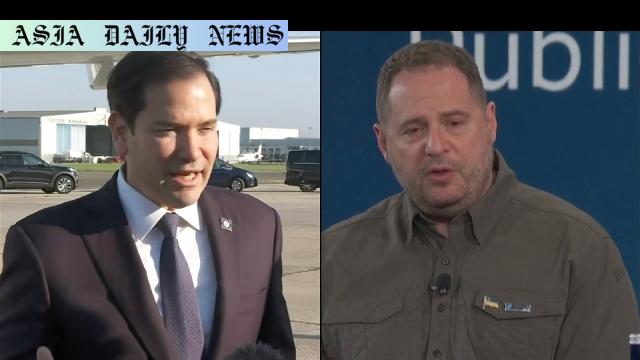Ukraine peace talks postponed due to differences in US peace proposal, highlighting ongoing geopolitical tensions.

Delay in Ukraine Peace Talks: A Closer Look
The ministerial-level meeting aimed at resolving the ongoing Ukraine conflict has been postponed indefinitely. Initially scheduled to occur in Britain, the talks were set to include top diplomats from Ukraine, the United States, and major European nations such as Britain, France, and Germany. However, differences over the US-proposed peace plan have caused a significant delay. According to the US State Department, Secretary of State Marco Rubio’s absence due to scheduling conflicts further complicated the situation.
The talks were intended to follow up on discussions held in France the previous week, reinforcing international cooperation in finding a resolution to the conflict. The core issue reportedly revolves around the US peace proposal, which suggests that Russia halt its invasion at the existing front lines and recognizes its unilateral annexation of Crimea. This proposal has not only sparked debate but also highlighted the differing approaches toward achieving peace in the embattled region. Ukraine firmly opposes any concessions, instead demanding an unconditional ceasefire as a prerequisite to further negotiation.
The US’s Position: Mediation at a Crossroads
The US has taken a firm stance, urging both Ukraine and Russia to consider its proposal seriously. Vice President JD Vance explicitly mentioned that Washington has issued its terms and expects a definitive response from both sides. Reports indicate growing frustration on the US side, with officials even hinting at the possibility of stepping back from mediation efforts altogether if progress remains stalled.
In a parallel effort to advance negotiations, President Donald Trump’s special envoy Steve Witkoff is set to meet with Russian President Vladimir Putin. This meeting underscores the urgency of the situation, as diplomatic channels strive to bridge the widening gaps between key stakeholders. However, the United States’ acknowledgment of Crimea’s annexation under the proposed peace plan has drawn criticism from both its allies and Ukraine, complicating the dynamics further.
Implications for Ukraine, Russia, and Global Relations
While the postponement of the talks may seem like a setback, it also serves as a crucial moment for reevaluating strategies and priorities. Ukraine’s insistence on an unconditional ceasefire reveals the depth of its resolve to fight for a complete withdrawal of Russian forces, signaling a potential stalemate in the peace process if key demands are not met. Meanwhile, Russia, buoyed by its military advances and territorial gains, appears less inclined to make concessions.
On the global front, European nations are caught between solidarity with Ukraine and the need to maintain stability in the region. France and Germany’s participation in these talks highlights their vested interest in ensuring a resolution, whereas Britain’s proactive hosting of meetings showcases its commitment to addressing the crisis. Nonetheless, the ambiguity surrounding the US’s future role as a mediator raises questions about the effectiveness of diplomatic efforts moving forward.
As geopolitical tensions continue to mount, the postponement of this crucial meeting signals the challenges inherent in resolving complex international disputes. Stakeholders must find a delicate balance between achieving peace and addressing the concerns of all parties involved. With millions of lives at stake, the world watches as key leaders navigate this tumultuous landscape.
Commentary
A Complex Road to Peace
The sudden postponement of the Ukraine peace talks underscores the complexities of international diplomacy. It is disheartening yet unsurprising that deep-seated disagreements among key stakeholders continue to hinder progress. The US-proposed peace plan, which includes Russia halting its invasion at the current front lines and recognizing its annexation of Crimea, has understandably raised concerns both within Ukraine and among its allies. Any acknowledgment of such territorial gains by force inevitably sets a dangerous precedent on the international stage.
Ukraine’s firm stance in demanding an unconditional ceasefire reflects its resilience and unwillingness to concede ground to aggression. While this position is admirable, it also complicates negotiation efforts. For Ukraine, an outright withdrawal of Russian forces is non-negotiable; however, achieving that through diplomatic channels will necessitate difficult compromises. Whether these compromises will be acceptable to all parties is the critical question that continues to hang over these discussions.
The Role of Mediation and Global Diplomacy
As mediator, the United States finds itself walking a tightrope, balancing its strategic interests with its role as a peace broker. While some might view its proposal as pragmatic, others see it as disproportionately favoring Russia in certain aspects. The frustration voiced by US officials, including Vice President JD Vance, reveals the limits of Washington’s patience. This raises the troubling prospect of the US stepping away from its mediating role altogether, a move that could further derail the already tenuous peace process.
European nations, particularly France, Germany, and Britain, have crucial roles to play in ensuring sustained dialogue. Their collective efforts provide a counterbalance to the US approach, emphasizing the need for a broader consensus over unilateral proposals. Still, whether these nations can reconcile their priorities with those of Ukraine, Russia, and the US remains to be seen.
Looking Ahead
Ultimately, the postponement of the Ukraine peace talks serves as a sobering reminder of the challenges in resolving conflicts rooted in ideology, geopolitics, and national security. The international community must remain steadfast in its commitment to peace, even in the face of setbacks. More importantly, this crisis highlights the need for innovative approaches, emphasizing dialogue, compromise, and the collective good.
With global stability hanging in the balance, the stakes are higher than ever. One can only hope that diplomacy will ultimately prevail, charting a path toward lasting peace for the people of Ukraine and a resolution that upholds justice and sovereignty.


